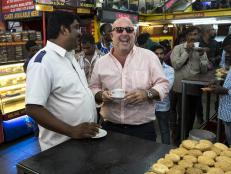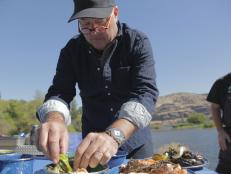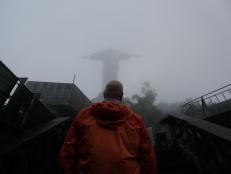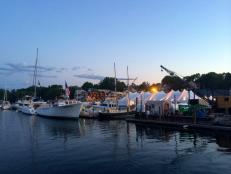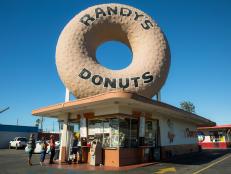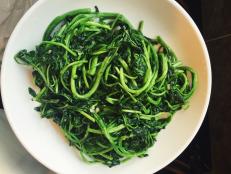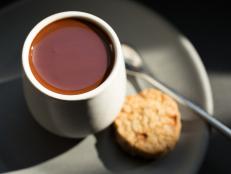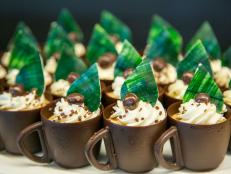Andrew Zimmern Reflects on 10 Years of 'Bizarre Foods'
Bizarre Foods premiered on February 6, 2007. In the decade between then and now, viewers have followed Andrew Zimmern to 173 countries where he’s created more than 300 hours worth of eye-popping programming. On the pilot episode alone, he visited Japan, Thailand and Malaysia, where he ate a frog’s beating heart, fruit bat, horseshoe crab and the notoriously stinky durian fruit (among other things).

As he launches into his 11th year of bringing undiscovered parts of the world into our living rooms, Andrew has turned the camera back on us: This season, he’s showing Americans what lesser-known parts of America look like. He retraces Lewis and Clark’s path to the Pacific, visits far-flung communities surrounding the Great Lakes, follows barbecue through the South—and that’s just for starters. This is much more than a road trip, mind you. He’s reminding us of just how much we can impact one another. Andrew chatted with us about the new season and what he’s learned—and taught—after more than a decade behind the Bizarre Foods wheel.
You’re such a wonderful guest when you go to all of these destinations on the show. No matter what it is that you’re trying or where you are, you convey this sense of graciousness. What's your philosophy on guesting?

Oh my gosh. I think being a good guest is the essence of taking care of your half of the responsibility for your half of the hospitality relationship. Brillat-Savarin wrote his aphorisms [on cuisine and hospitality], and my favorite one is that while [they’re] under your roof, you’re responsible for the happiness of your guests. I also believe guests have a responsibility to be respectful, to participate, to engage. I think that most of the people who do what I do on TV are obnoxious buffoons and don’t represent themselves very well, and I think they’re disrespectful to the people around them. I made a very clear decision early on in my television life that it’s more important to be a good guest — I’m going to be the first American, the first white person, the first white man, the first bald guy, the first recovering alcoholic and drug addict, the first whatever to be in that place, and I need to represent myself a certain way.
That brings to mind the San Francisco episode where you went to [the vegetarian nonprofit] Food Not Bombs and spoke to freegans about freecycling. You talked about how much of a paradigm shift that was for you. That kind of respectfulness, that kind of opening of horizons seems to be a big pull for Bizarre Foods, showing viewers things that help shift their paradigms, as well.
Absolutely. That’s the whole point of our show: People attach to the food, I use the food as a tool. People think of it as, “Fat white guy goes around world, eats bugs.” I think of it as an agent for social change, trying to get people to practice more patience, tolerance and understanding in their lives, which I think is very important.

When it comes to food activism and sustainability, we often hear things like, "I'm not ready to be a vegetarian, I’m not ready to be a vegan, so it doesn’t matter. I can’t escape Big Farming, what can I possibly do to make a difference?” What would you say are some first steps to eating and consuming more consciously?
Well, I think every person can do that immediately with some of their choices, when it comes to where they choose to spend money, where they choose to shop. It’s almost become a—I wouldn’t say a constant thorn in my side, but I get this question a lot from people, and it puzzles the crap out of me—because there’s more information about this at this point in the world than there has ever been before, and it’s an easy thing to do: to shop wiser, to eat seasonally, to take a meal out of the wild once or twice a month, to go vegetarian once or twice a month, to be vegan before dinner during work days. All of those things are really, really, really important, and I think that when you add them all up it’s enough of a way to tip the scales in our favor as—well, as citizens of the world.
One of the lines you use often is, "If it looks good, eat it." Is there anything, from a sociopolitical perspective, that you would say, "No, that’s something I don’t want to try," not because it looks gross or unsafe, but because it’s something you think isn't right to eat?
Well, any endangered species, any threatened species is right off the table for me. That’s a deal-breaker.
That’s always seemed to be a through-line with you, along with foraging. You did a lot of foraging in the first episode of the new season of Bizarre Foods along the Lewis and Clark Trail, and it’s something a lot of people find pretty intimidating. Is that something that you would advise taking a class on, or asking a chef about?

I’m starting a new initiative with a couple of my companies built around culinary literacy. I think people know they’ve got to read a certain number of books and types of books to consider themselves well read. I think a lot of people consider themselves food lovers — I don’t allow anyone to use the term "foodie" or "veggie" in my presence — yet they’re not food literate. So I think if you want to be food literate, you don’t need to be walking for 20 miles in the Tennessee woods to forage. I can go across the street into the parking lot and find edible shoots and things even in the wintertime here in Minnesota. So I do encourage people to get out there and do the things they love. If you love the outdoors and walking — a lot of people say they take walks every day — you’d be stupid not to take a foraging class where you live.
Now that you've been doing this for a decade, do you find that you’re fielding different questions from your various audiences, as opposed to in the beginning when people might have said, “Oh man, that guy’s eating bugs”?
Yeah, I mean, every year that goes by for the last 25 years, we’ve been in this major renaissance of a glorious romanticized relationship with food. Every year people get smarter and better.
The stories you’re telling this season are all about undiscovered America. It’s pretty mind boggling to think about Lewis and Clark, for instance, and the fact that these guys who were so capable and curious found themselves starving in the Pacific Northwest, which has some of the most dazzling resources of any part of the country. Or the Yoopers [of Michigan’s Upper Peninsula, in the Great Lakes episode], which I’d never even heard of before. Are those the stories you see yourself telling going forward?

Sam Reed Johnson
I don’t know, I have no clue! [I have] some really big ideas about the nature of food and travel and history and where those three intersect. I’d like to do some really special episodes of Bizarre Foods that are perhaps larger in scope than the ones that we do now. I have about a hundred new shows I want to do [laughs]. I’m an ideas person, and I’m at a point in my career where there are some things I really want to check off the box before I hang up my cleats.
How do you feel about people documenting their own food experiences in terms of things like social media? The classic person-Instagramming-their-dinner kind of thing?
Well, the other day I was with some friends, and I told a "Hitler and Mussolini walk into the bar" joke. They laughed—it was a really funny joke. I would never tell that joke in front of my grandmother, who lost friends and relatives of ours in the Holocaust. Social media I use all the time, and you know the places and the times when it’s OK. If somebody even hints at you that it’s not OK—I mean, there are restaurants with signs that say, "Please don’t take pictures in the dining room, it disturbs other guests"—don’t do it. If you’re invading someone else’s privacy, don’t do it.
Speaking of politics, and areas of the world that are experiencing political strife, how does that [strife] affect the likelihood that you’ll go to a place, or does that change the story that you want to tell when you’re there?
I’m a very political person, and I haven’t been shy about that at all, but from a public standpoint I’m engaged in civics. Civics is apolitical, it’s about best outcomes for all, and I believe in going to places where we can make a point about civics. I can do that in the hallway outside my office, or I can do it in Latvia. It doesn’t matter.
You make a lot of points about good citizenship in the stories you’re telling this season, [like] the woman in the Columbia River Gorge who offers meat to travelers [in the Lewis and Clark episode].
Wait 'til you see some of the later shows! I think that’s my responsibility as a storyteller.
Interdependency - the way that people take care of each other - is a theme that you’ve really come back to again and again in your shows and your work.
Dating back to our earliest times, pre-humanoid, we’ve always been about community and each other. [That’s] one of the places where we’ve lost our North Star, where our compass has malfunctioned over the last several thousand years of human history. We’re accelerating at a rapid pace in disassociating from that nature of community and interdependence, community reliance rather than self-reliance. I see the prescription to cure that in the tribal communities and the smaller, protected communities around the world that I interact with. It’s a very obvious connection point for me.

Sam Reed Johnson
Do you find that that message has been getting through?
Oh, absolutely. I mean, look. Some people see this fat guy who runs around the world and eats bugs, but the rest of the world sees the show for what it is.
When it comes to this current season, is there something you’re especially excited to be getting to show people?
Oh yeah, I can’t wait. I mean, when people see what’s really going on in rural Louisiana and rural Mississippi during our Cajun Country show and our Tom and Huck Mississippi River show respectively, I think they’ll have a much better understanding about the way the rest of America lives, works, thinks and eats. It’s going to be a good time.
An all-new episode of Bizarre Foods with Andrew Zimmern, premiere on Travel Channel starting Feb. 14, at 9|8c.
